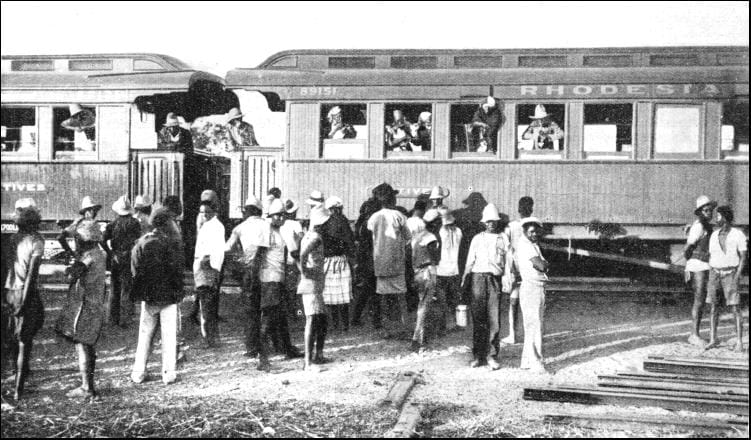The Carryings On In the Carriages

The typical Rhodesian carriages that transported children on the long journeys to and from boarding schools in Southern Rhodesia.
The Carryings On In the Carriages
In 1897 a railway siding, Plumtree, was built on the border with Bechuanaland in Rhodes’ Southern Rhodesia, recently established by his private British South Africa Company. In 1902, Plumtree School was founded by the Railway Mission.
The Carryings On In the Carriages
From the top of the pile at Cecil John Rhodes Junior School in Gwelo, Tim Hughes found himself at the bottom of the pecking-order at Plumtree. The train took all night from Hunters Road siding to Bulawayo. The ‘new- boys-concert’ started soon after Tim located his sleeping compartment.
The older Plumtree boys on the train spotted the ‘new-boy’ by his school uniform and immediately summoned him to sing songs to entertain them. Mina chia wena, Mina chia wena: threats to beat him to a pulp kept the songs flowing. The more tearful he was the better the old boys liked it. After a two hours wait in Bulawayo the train to Plumtree finally delivered Tim to Plumtree school, late in the afternoon.
To return home for holidays at the end of each three month term was complicated. On break-up night a number of railway carriages were parked at the railway yards to be shunted onto the mail-train from South Africa at midnight. The school boys were given their train tickets in the evening and were without teacher supervision from that time on.
It was party time. Bottled Castle Lager was purchased before the bottle shop closed at 5pm. Any unshaven school boy who could pass as an adult collected the group’s money and bought beer to be consumed later in the carriages. Nobody risked missing the only train home.
Smoking went with drinking beer and was the tough thing for thirteen year olds to do. Cheap cigarettes were purchased at the railway cafe. The girl at the counter usually said, “You are too young, I can’t sell cigarettes to children.” To overcome the hurdle they gave the money to an African railway porter. For the modest fee of one cigarette, he would do the buying. Tim and most of the boys only smoked because it was against the rules.
Tim’s best friend, Ron Thomson, said “Do you know that if you smoke you will never be any good at long distance running?” Tim was keen to do well in the mile and cross country races. Ron usually came first in any race he entered. From that day on Tim never smoked.
The mail-train would reach Bulawayo by early morning. No self-respecting Plumtree School boy would breakfast at the railway restaurant. Tim and his friends hired taxis to take them to the Kingfisher Restaurant. Much to the dismay of the African taxi drivers, the boys crammed as many as possible in each taxi to reduce the individual cost.
The daily mail train to Gwelo and north to Salisbury left mid morning. The boys could only stay an hour at The Kingfisher, then hired taxis back to Bulawayo railway station. At Hunters Road siding Tim was met by his step-mother Dorothy, who daily collected her cream cans from the railway station. She would drive very slowly home to Melrose farm. If cattle were being herded by Africans along the road, the usual reaction from the herdsmen was to hit the cattle with sticks to drive them out of the way of the vehicle. Much to Tim’s embarrassment Dorothy would shout at the herdsmen ‘Hikona Chia, Hikona Chia’ (Don’t hit, don’t hit).
Many thanks to Tim Hughes of Queensland, Australia for the excerpt from his unpublished manuscript Matambega and Son written in the 1980’s. Photo obtained from http://www.engrailhistory.info/r172.html
